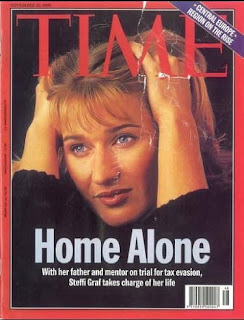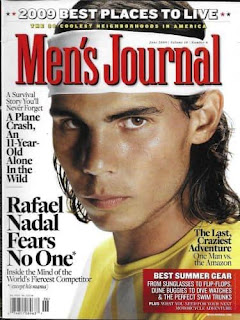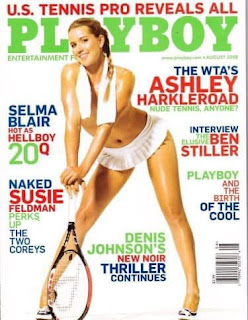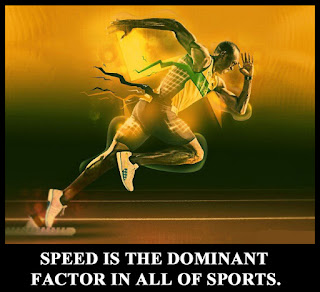Thursday, December 24, 2020
Saturday, December 19, 2020
Tennis Is Life : ATP & WTA Tours ("Tennis uses the language of life." Andre Agassi)
Any hour can be our finest, or darkest. It's our choice!
Friday, December 11, 2020
Wednesday, December 9, 2020
Monday, November 23, 2020
Sunday, October 11, 2020
Sunday, October 4, 2020
Tennis Book Review: The Rise of Superman: Decoding the Science of Ultimate Human Performance, by Steven Kotler
Tennis players call it "being in the zone." Marathoners call it "runner's high." Action and adventure athletes call it "the flow". Psychologists call it "optimal performance."
What is it? It's a mental state of effortless decision-making and intense creativity. And it results in supreme performance.
Some describe it as a zone where action and awareness converge, and become heightened. And time itself dilates and distorts - meaning it sometimes seems to move slower and sometimes faster, depending on what helps to achieve the task at hand. People say that your sense of "individual self" disappears. And your awareness, almost mystically, merges with the universe.
And it's experienced by not only athletes but also musicians, architects, engineers, artists, authors and many others. It applies not only to sports but also to art, poetry, music, writing and other fields. Indeed, anyone engaged in a great human challenge requiring supreme creativity and energy can potentially experience it.
How does it work? And how do you achieve it?
Those are the questions this book seeks to answer by exploring the science of this state known as: "the flow."
Steven Kotler is a sports journalist who chooses to examine "the flow" through investigating "extreme" athletes who perform under pressure in "high-risk" sports. Examples of these are mega-wave surfing, big-ramp skateboarding, and free mountain-climbing (done with no ropes). And he reviews and analyzes more than 10 years of scientific research into the topic.
His conclusion: "The flow" is a definable and knowable state of behavior. It can be "decoded." And its blueprint can be followed by all of us to try and reach higher performance levels in any human activity.
And while it may be true that most of us may never reach the supreme level of "genius" or "legend' --- the bottom line still is that we all embody the capacity to rise up a little closer to "Superman."
A few suggested Flow Conditions and Triggers:
Kotler proposes that this special state requires certain FLOW CONDITIONS.
*The sense of "individual self" vanishes
*Time dilates and distorts
*A state of fearlessness to the body and in the mind
*All "non-essentials" to the task at hand fall away
And that to help us get there we focus on practical points called FLOW TRIGGERS.
*Letting go of your surroundings
*Staying in the Present
*Ultra focus on the task or object at hand
*Visualizing optimal performance
You Tube Video (12:42):
"What the Science of Flow Can Teach Us About Limitless Performance" (Steven Kotler)
Sunday, September 27, 2020
Wednesday, September 16, 2020
Monday, September 14, 2020
Thursday, September 10, 2020
Tennis Book Review - Pete Sampras: Greatness Revisited, by Steve Fink
Pete Sampras: Greatness Revisited, by Steve Fink (New Chapter Press: September 2020)(380 Pages)
Pete Sampras, one of the greatest tennis players of all time, and his career are masterfully chronicled in this wonderful new book by Steve Fink, renowned tennis journalist and historian. Sampras dominated the game in the 1990s, together with his rival fellow American Andre Agassi.
Sampras, with his legendary serve-and-volley game and gentleman's persona, embodied his era of tennis. From the practice courts of California to the storied grounds of Wimbledon, Sampras compiled a then-record 14 Grand Slam Championships.
He left a enduring legacy of an overpowering all-court game. This biography showcases the Sampras story.
Wednesday, September 2, 2020
Tuesday, September 1, 2020
Monday, August 24, 2020
Saturday, July 25, 2020
Friday, July 3, 2020
Harnessing Emotions in Tennis (Tennis and the Coronavirus Lockdown)
"Playing with Fire: The Delicate Role of Emotion in Pro and Rec Tennis", by Steve Tignor, (July 02, 2020) at Tennis.com
Harnessing your emotions in tennis can raise your performance, or smooth rough patches.
Four (4) techniques to help harness emotions in tennis:
1. Prepare mentally as well as physically: Hydrate, sleep recovery, visualization and imagery
2. Focus on what you can control: Awareness, breathing, footwork
3. Welcome frustration: Channeling anger into "controlled aggression"
4. Don't give yourself time to get negative: On-court rituals, positive body language, patterns of relaxation and confidence
Monday, May 25, 2020
Self-Belief and Tennis: 10 Ways to Build Your Self-Belief (Tennis and the Coronavirus Lockdown)
Self-Belief is about believing in your own abilities, skills and passion. And it leads to self-confidence.
It's essential for taking massive action to reach your goals.
And to learn from past mistakes and grow.
Ten (10) Ways to Build Self-Belief:
1. Realize It All Starts with You - Try "Priming" (Starting off the day with positive, re-enforcing routines)
2. Re-Examine Your Limiting Beliefs
3. Learn to Respect Yourself - and maintain a positive self-image of yourself
4. Use the Law of Attraction - to get closer to inspiring people
5. Get Inspired - by others, quotes, stories, books, videos, documentaries
6. Remember Your Past Successes
7. Face Your Fears
8. Create Goals which are A. Attainable and B. Aspirational: and Take Action
9. Learn or Discover a New Skill or Ability
10. Keep Going - There is no finish line for learning and growth.
Sunday, May 24, 2020
Relaxation and Tennis: 6 Techniques to Improve Relaxation (Tennis and the Coronavirus Lockdown)
Relaxation is an art and science.
And it's vital for success, stress management and happy living.
Relaxation is a learned activity through practice and techniques.
Six (6) Techniques to Improve Relaxation:
1. Quick Cool Down Through Breathing: Two types.
A. Slow, Deep Diaphragm Breathing. Inhale through the nose, exhale through the mouth.
B. Mouth-to-Nose Breathing. Inhale by breathing in through the mouth, cool your tongue, then exhale through the nose.
2. Stand Tall - Good Posture
3. Watch Your Caffeine - Limit Your Intake
4. Consider Accupressure - Proven way to instantly relax
5. Take a Song and Humor Break - Listen to music and humor, smile and laugh
6. Fine-Tune Your Mind Set - Re-set by re-committing to your values and lifestyle
Saturday, May 23, 2020
Energy and Tennis: 8 Simple Ways to Increase Energy (and 6 Foods That Help Too) (Tennis and the Coronavirus Lockdown)
Energy is "holistic": a combination and balance of MENTAL clarity, EMOTIONAL calmness and PHYSICAL alertness.
Eight (8) Simple Ways to Increase Energy
1. Establish a regular and dependable routine
2. Embrace a healthy, organic diet
3. Supplement your diet with vitamins and supplements
4. Get sufficient exercise
5. Prime yourself for success mentally (mindfulness, empowering self-talk)
6. Learn to control your feelings
7. Embrace the idea that Life is happening TO YOU and NOT FOR YOU. (learn from what is happening)
8. Transform your self-talk and self-image from cynical or negative to empowering and positive
Six (6) Foods that Help Provide Energy
1. Broccoli
2. Salmon
3. Lentils
4. Bananas
5. Sweet potatoes
6. Eggs
Tuesday, May 19, 2020
Monday, May 18, 2020
Friday, May 1, 2020
Documentary Review: In Search of Greatness - Secrets of Genius, by Director-Writer Gabe Polsky (Tennis and the Coronavirus Lockdown)
And what roles do "nature"and "nurture" play? And what about talent and creativity versus training and learning?
What do sports icons such as Pele, Gretzky, Jordan, Federer, Ali, Marciano, Brady, Jerry Rice, Serena and Venus Williams and others in their league have in common? What sets apart the Great Ones from the rest of us mere mortals?
Director Polsky seeks to find out by extensively interviewing some of the greats (Pele, Gretsky, Jerry Rice and others such as noted Sports Writer David Epstein and acclaimed Educationist Sir Ken Robinson). He reviews clips and commentary from many other sports legends ranging from Michael Jordan to Red Auerbach to John McEnroe, and even cultural icons outside of sports, including the Beatles and David Bowie.
- The Great Ones have gained a body of mastery over their craft but don't accept their limitations or that of their craft.
- They possess exquisite body awareness and precision movement.
- They show a higher level of speed than their peers - a web of sheer invisible anticipation.
- They develop their own style and flair in defiance of paradigms.
- They constantly utilize visualization techniques, but raise it to the level of Vision (a heightened image of themselves performing their craft at a supreme level).
- They are always on a process of unbounded personal discovery about the sport, the ball, the body and everything related to their craft.
- They strive for excellence - not for results or money, but for self-satisfaction and fun.
- They use some of their time to engage in "unstructured" practice and play to continuously expand and grow.
- They show no fear, and demonstrate a supreme desire to exhibit excellence - elevated to almost a happy showmanship.
- They see themselves ultimately as a Master Artist striving for perfection.
Thursday, April 30, 2020
Home Tennis - Tennis at Home: Six Ways to Improve Your Tennis Game from Home (Tennis and the Coronavirus Lockdown)
1. Practice Shadow Swings
2. Get Creative with Tools You Have Around You
3. Practice Visualization Techniques
4. Get in Tennis Shape thru Home Exercises, Yoga, Tai Chi, Pilates
5. Learn from the Best Players thru Online Videos
6. Improve Your Tennis IQ thru Articles, Books, Websites, Podcasts, Videos
For more on this topic, see: How to Improve Your Tennis Game at Home, by TennisGate Online Academy
Wednesday, April 29, 2020
Competition and Tennis - What Players Should Know (Tennis and the Coronavirus Lockdown: Knowledge from Home)
1. Competitive tennis is hard work. Stop looking for short cuts.
2. There is no such thing as an indirect win. Peter beat Tony and I beat Peter so I beat Tony. Sorry! You have to beat Tony on the court.
3. No one cares if you lost because you played badly. Stop annoying us and keep it to yourself.
4. Before you beat anyone, you have to win the battle against yourself. Conquering your fears and emotions is step one during competition.
5. Thinking you are better than someone else is not quite the same as beating him/her on the court.
6. I am sorry to shock you but tennis is a running game. Shut up and run!
7. If you want to win, there is one rule you cannot ignore: The ball has to land inside the lines and clear the net. There are no points for style.
8. The most important element of a clean winner is the “in” factor not the “hard” factor.
9. You get a point for a winner and you lose a point for an unforced error. They both count the same. Make sure it balances in you favor at the end of the match.
10. You cannot always practice with better players because better players want to practice with better players.
For many more pointers, see: What Every Coach of Competitive Players Hopes His or Her Players Will Eventually Understand, by TennisGate Online Academy
Tuesday, April 28, 2020
Pilates and Tennis (Tennis and the Coronavirus Lockdown: Knowledge from Home)
Monday, April 27, 2020
Yoga and Tennis (Tennis and the Coronavirus Lockdown: Knowledge from Home)
Qualities of Yoga applicable to tennis include:
*Flexibility
*Mindfulness of "the Present" and Breath Control
Sunday, April 26, 2020
Tai Chi and Tennis (Tennis and the Coronavirus Lockdown: Knowledge from Home)
*Balance and body awareness
*Weight-shifting
*Projecting internal energy
*Focus and stillness
Saturday, April 25, 2020
Confidence and Tennis: Tennis Quote of the Day - "Confidence" (Tennis and the Coronavirus Lockdown)
Friday, April 24, 2020
Thursday, April 23, 2020
Movies and Tennis - Let's Go to the Movies (Tennis-style)! A few choices . . . (Tennis and the Coronavirus Lockdown)
2. Resurfacing (2019): Documentary showcasing the hip injury and recovery of Wimbledon champion Andy Murray from 2017 to 2019. (Amazon Prime)
3. Battle of the Sexes (2017): Biographical sports film loosely based on the 1973 exhibition tennis match between Billie Jean King and Bobby Riggs at the Houston Astrodome, the most watched sports event of all time. (Amazon Prime)
4. Borg v. McEnroe (2017): Biographical sports film showcasing the famous rivalry between tennis stars Bjorn Borg (Sweden) and John McEnroe (USA) culminating in the 1980 Wimbledon Championships. (Hulu, Amazon Prime)
5. 7 Days in Hell (2015): A "mockumentary" comedy inspired by the Isner-Mahut marathon men's singles match at the 2010 Wimbledon Championships. Two players battle in a tennis match over seven days. World-class cameos by Serena, McEnroe, Evert and others. (HBO, Hulu)
Wednesday, April 22, 2020
Sunday, April 19, 2020
Saturday, April 18, 2020
Friday, April 17, 2020
Thursday, April 16, 2020
Wednesday, April 15, 2020
Vision and Tennis: *Knowledge from Home* (Tennis and the Coronavirus Lockdown)
2. ZOOMING (ball towards you): From the bounce, the ball is ascending, at the top, or descending (or in hit in the air).
3. SCANNING (ball away from you): After your ball strike, anticipating your next shot by observing the opposing player, and his or her posture, balance, contact, strike zone, preparation and patterns.
Tuesday, April 14, 2020
Balance and Tennis: *Knowledge from Home* (Tennis and the Coronavirus Lockdown)
Read more about Building Balance Skills in Tennis:
"Acquiring Balance Skills Essential for Tennis"
Feisal Hassan, USPTA Master Professional
Monday, April 13, 2020
Good Posture and Tennis (On Court and Off): *Knowledge from Home* (Tennis and the Coronavirus Lockdown)
1. Use a "Mental Mirror": Think about how your body looks to others. This automatically makes you look straighter, etc.
2. Look Up: when you walk, talk or sit.
3. Clasp Your Hands Behind Your Back: forces you to think about posture and get straight.
4. Set an Alert on your fitness watch or alarm clock to check your posture.
5. Get Up Each Morning mindful of putting on good posture.
Source Credit:"8 Simple and Surprising Ways to Improve Your Posture, You'll Have More Energy and Confidence", Bottom Line Personal Magazine (BottomLineInc.com), Joel Harper, Trainer and Author



















































